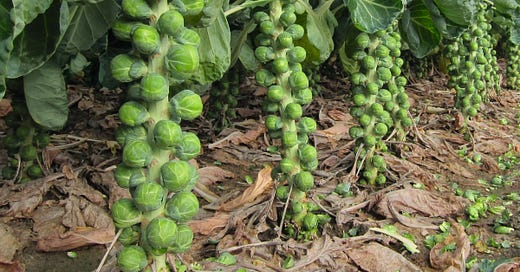Don’t want to read? Watch a video summary of this article here on TikTok.
It’s Extreme Makeover: Vegetable Edition.
In 1999, the Los Angeles Times wrote: “Brussels sprouts are never going to win any popularity contests. They’re the weak member of the vegetable pack, the one everyone likes to pick on.”
Two decades later, the culinary world’s tune changed. Today, though, Brussel sprouts are everywhere. In 2012, Slate wrote: “Brussels sprouts’ transformation from maligned cafeteria gross-out fare to foodie luminary is complete. Trendy New York restaurants gussy them up with pig fat and sell them by the tiny $8 plateful; David Chang’s Brussels sprouts at New York’s Momofuku were so popular he had to take them off the menu for his cooks’ well-being.”
From 2006 to 2018, Brussels sprouts consumption per capita experienced a 10.7% annual growth rate, and farmers in 2019 were earning five times more money for their sprouts than they did a decade prior.
The transformation from loathed to loved began in the 1990s when Dutch scientist Hans van Doorn — working at the seed and chemical company Novartis — started studying Brussels sprouts.
He wanted to figure out what caused the bitter taste in the sprouts, and after months of research, he figured it out: glucosinolate compounds.
The plant produces these compounds to defend against leaf-eaters like insects and slugs. But this defense was often a bit too successful, repelling many human eaters too.
Thus, because the bitter taste of the glucosinolate repelled the predators, van Doorn and his colleagues realized that the less glucosinolate in the sprout, the milder and sweeter the taste.
Capitalizing on this discovery, Novartis turned to their seed bank, which contained dozens of Brussels varieties. For each variety, they analyzed the glucosinolate content and then correlated these measurements with feedback from a tasting panel. From this research, the team selected the best Brussels: the ones that not only tasted sweet (i.e., low glucosinolate) but also had high sprout yields.
Then, Novartis started growing these Brussels. The first of these sweeter sprouts hit the market in 1994. Since then, Novartis and other companies have kept up their research, crossbreeding new varieties and creating tastier Brussels sprouts. And, in turn, the popularity of the Brussels sprout continues to rise.
A new trajectory for an old vegetable, all thanks to identifying one chemical compound.






I used to hate brussels sprouts as a kid, but now I love them. I thought it was because my taste buds have changed as an adult, but you've proven me wrong!
I thought it was just because people figured out the correct way to prepare & cook them! See science isn’t all that bad, especially when it comes to food!